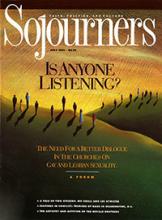The world's oldest profession, Fritz Eichenberg believed, is the making of images. For proof he offered the illustrated walls of the caves of Altimira and Lascaux, where unnamed artists affixed brilliant lines and vivid colors to rock 15,000 years ago.
Fritz was attracted to the profession of image maker as a child growing up early in this century "in the most Catholic city of Cologne, one great picture book, with its ancient wood carvings of saints and sinners and its heritage of painters and wood carvers." Fritz regarded his lifelong passion for cutting images into wood as Cologne's great gift to him.
He was born in 1901 into a Jewish family, though "we were not a religiously-motivated family," Fritz recalled. His father was ill through much of his childhood, dying when Fritz was 14.
"I grew up with the same mistake as all assimilated Jews in Germany, thinking we were German." He remembered his school as "very Prussian, very militaristic [where] they treated us like little soldiers." Here he learned "how brutalization kills understanding between countries, between people, within families." At the age of 5 or 6 he was one among the thousands of school children waving little flags as the emperor entered the city. "We were raised to think consciously of the emperor as a divine person." The poetry and songs students learned were for the glorification of empire.
"The Lord protected me from wanting to be a part of all that. I hated regimentation."
Fritz was 13 when World War I began. He experienced the social madness war occasions, and the bitter, poverty-stricken aftermath of defeat. Still a student, he got a taste of personal freedom by attending evening art classes. He spent countless hours sketching animals at the city zoo -- caged creatures and yet in some ways freer than their human admirers. They were not required to be patriotic.
Read the Full Article

